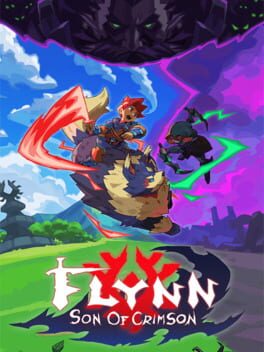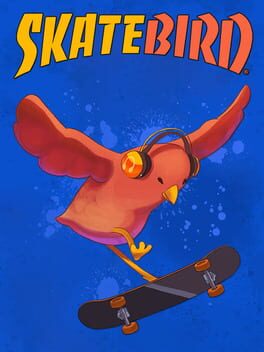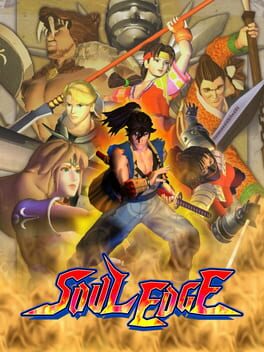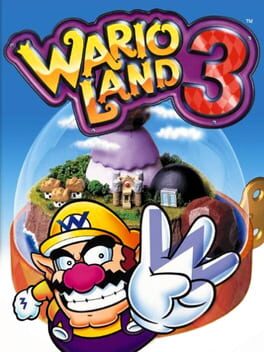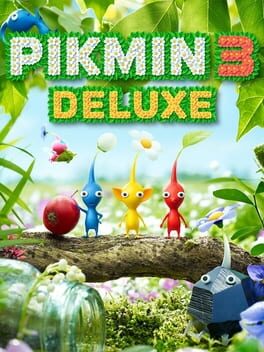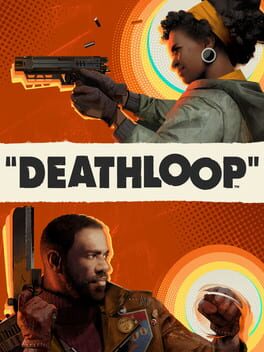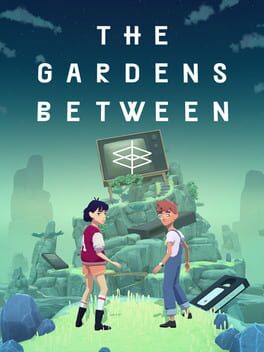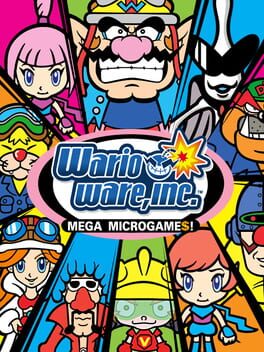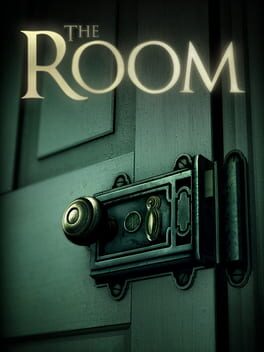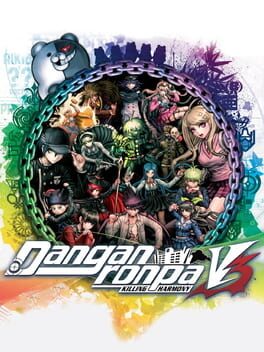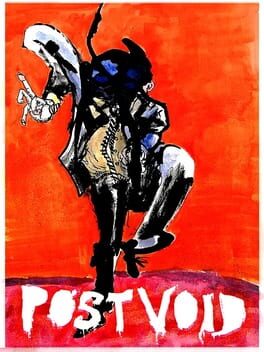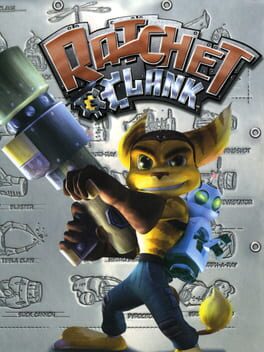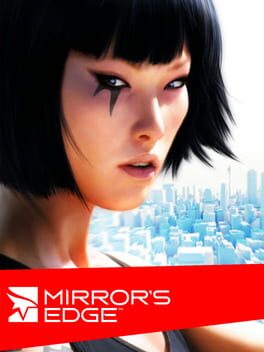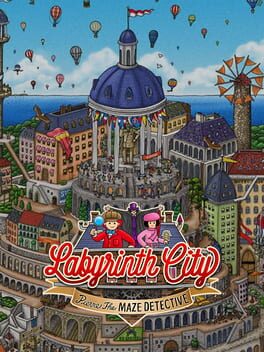tangysphere
BACKER
604 Reviews liked by tangysphere
You know that sort of game where after a bit you're just playing for the sake of playing. You don't actually like the game you're playing all that much but you've already plugged enough time into it to the point where you feel like you need to finish?
Yeah. 'Flynn: Son of Crimson' was that game for me. Its not a horrible game by any sense of the imagination but its also one that isn't very memorable either. Combat is button mashy, graphics are cute but rather generic (with the exception of good doggo) and the overall level design is incredibly plain.
I mean... I cant really name anything I particularly liked, any interesting story or character moment or anything I can recommend and I literally just finished the game only ten minutes ago. It really is the videogame equivalent of fast food.
Yeah. 'Flynn: Son of Crimson' was that game for me. Its not a horrible game by any sense of the imagination but its also one that isn't very memorable either. Combat is button mashy, graphics are cute but rather generic (with the exception of good doggo) and the overall level design is incredibly plain.
I mean... I cant really name anything I particularly liked, any interesting story or character moment or anything I can recommend and I literally just finished the game only ten minutes ago. It really is the videogame equivalent of fast food.
Skatebird
2021
The vibes are first-rate and the idea of Tony Hawk with mid-air controls is quite good, but mechanically it barely improved since the kickstarter demo and even after messing with the game for a few hours it's been impossible to get a proper grip of controls. Just a bummer that no 15 seconds in Skatebird can pass without something feeling terribly scuffed.
Soul Edge
1995
There are so many great writers on Backloggd. Well-crafted pieces by an incredible group of some of the most passionate people I’ve ever seen anywhere. They make amazing, thoughtful, and profound analysis for games I’ve never even heard of and give them the justice I didn’t know they needed. They are an inspiring group of people, and I feel privileged to interact with them on the Backloggd discord almost every day. I had a passion for writing once, I even went to college for it because it felt like one of the few things I was capable of doing. Since that moment in time though it feels like that passion and others have been wrung out of me. College made me hate writing and I dropped my major, after which I coasted through school like a lost balloon, no care for where the wind was taking me and just hoping that if I landed it would be somewhere safe that I could live from. I’ve been on solid ground again for some time now, but at this point in my life I’m in the middle of a job search that isn’t going so well and that’s giving me a lot of time to myself. Most of it I’ve used to think about passion, some that I’ve lost and some that I’ve been desperately clinging to.
This week I’ve been spending time with Soul Blade, the direct source of perhaps my one and only enduring passion. Soul Blade was my first fighting game, the one that means the most to me, and the reason why fighting games have outlasted anything that could have drained the joy out of the only thing in my life I’ve always loved besides my friends and my brother. I’ve been playing Soul Blade since before I was in school and despite not doing more than mashing buttons when properly playing, it never mattered. I was restarting my PS1 just to watch the intro over and over again, I was lucking my way through the arcade mode just to see the stages, hear the music, to see the characters and mimic their voices and moves because I thought it was all the coolest thing in the world. The adoration only deepened as I got older. I was getting better, I was using training mode, I was acting with intention, beating arcade modes, getting the endings, playing Edge Master mode and reading the journey of each character in it while unlocking all their weapons, all while excitedly showing it to anyone who would give me the time to do it.
Over time, since my love was so obvious for it, family was gifting me other fighting games on birthdays, Christmas, or just to see me smile at the mall. I was exposed to Tekken, King of Fighters, Street Fighter, Capcom vs SNK, Mortal Kombat, Virtua Fighter, Guilty Gear, and of course Soul Calibur. I was obsessed with them all, each had the elements of Soul Blade I loved in their own flavors. Friends often lived quite a bit of time away from each other where I grew up so outside of school most of my time was to myself. I loved plenty of games I played during that time but I always cherished the time I spent in fighting games the most of them all. There was a moment though where I sacrificed some of that time to be a part of the Call of Duty boom, fighting games just weren’t a thing people cared about around me and I was failing to use them as a way to build connections. I realized eventually that there was never any enthusiasm in me when I was playing, it was just the only means I could find to make friends with but I was a damn lucky kid because I underestimated my friends. One day I was tired of forcing myself to play multiplayer FPS games and sold every single one I had played in that three-year period for Persona 4 Arena, ready to face whatever I heard from my group when I gave them the story. Imagine the feelings I had when I realized not a single one of those lovable idiots was ever gonna abandon me and from that moment on they listened to me gush about these games that had made me into who I was.
Fighting games, Soul Blade, and my friends taught me about passion and gave me the tools I needed to use passion to mold me. Even if the world has beat me down, taken some of my joy on its way back, and left me with only what I could hold as tight as possible to my chest this genre specifically has always given me a tool I can use to prove I love something, to remind me I am capable of passion. I don’t know if my passion for writing is back yet, it feels like I might have to build it back up from zero but I know I have to thank Soul Blade again because it taught me another lesson all these years later. That my passions could return and that I’m still capable of what I was before.
This week I’ve been spending time with Soul Blade, the direct source of perhaps my one and only enduring passion. Soul Blade was my first fighting game, the one that means the most to me, and the reason why fighting games have outlasted anything that could have drained the joy out of the only thing in my life I’ve always loved besides my friends and my brother. I’ve been playing Soul Blade since before I was in school and despite not doing more than mashing buttons when properly playing, it never mattered. I was restarting my PS1 just to watch the intro over and over again, I was lucking my way through the arcade mode just to see the stages, hear the music, to see the characters and mimic their voices and moves because I thought it was all the coolest thing in the world. The adoration only deepened as I got older. I was getting better, I was using training mode, I was acting with intention, beating arcade modes, getting the endings, playing Edge Master mode and reading the journey of each character in it while unlocking all their weapons, all while excitedly showing it to anyone who would give me the time to do it.
Over time, since my love was so obvious for it, family was gifting me other fighting games on birthdays, Christmas, or just to see me smile at the mall. I was exposed to Tekken, King of Fighters, Street Fighter, Capcom vs SNK, Mortal Kombat, Virtua Fighter, Guilty Gear, and of course Soul Calibur. I was obsessed with them all, each had the elements of Soul Blade I loved in their own flavors. Friends often lived quite a bit of time away from each other where I grew up so outside of school most of my time was to myself. I loved plenty of games I played during that time but I always cherished the time I spent in fighting games the most of them all. There was a moment though where I sacrificed some of that time to be a part of the Call of Duty boom, fighting games just weren’t a thing people cared about around me and I was failing to use them as a way to build connections. I realized eventually that there was never any enthusiasm in me when I was playing, it was just the only means I could find to make friends with but I was a damn lucky kid because I underestimated my friends. One day I was tired of forcing myself to play multiplayer FPS games and sold every single one I had played in that three-year period for Persona 4 Arena, ready to face whatever I heard from my group when I gave them the story. Imagine the feelings I had when I realized not a single one of those lovable idiots was ever gonna abandon me and from that moment on they listened to me gush about these games that had made me into who I was.
Fighting games, Soul Blade, and my friends taught me about passion and gave me the tools I needed to use passion to mold me. Even if the world has beat me down, taken some of my joy on its way back, and left me with only what I could hold as tight as possible to my chest this genre specifically has always given me a tool I can use to prove I love something, to remind me I am capable of passion. I don’t know if my passion for writing is back yet, it feels like I might have to build it back up from zero but I know I have to thank Soul Blade again because it taught me another lesson all these years later. That my passions could return and that I’m still capable of what I was before.
Wario Land 3
2000
Pikmin 3 Deluxe
2020
Another game in the pile of shame, another game that I was very close to completing. I had played this mostly when I got it, and dipped in and out a couple of times, but after a while away from it, thought I'd get stuck in again.
Turns out I was on the last mission. This was a really fun game. I enjoyed the level design, the different creatures and just how good it looked over all. Great water effects. Not normally my type of game, it was very satisfying to play.
Turns out I was on the last mission. This was a really fun game. I enjoyed the level design, the different creatures and just how good it looked over all. Great water effects. Not normally my type of game, it was very satisfying to play.
Deathloop
2021
Deathloop is the logical endpoint of the genre of Immersive Sim when it comes to how we tell stories using it.
Before that, we have to talk about Immersive Sims or at least one of them,
Hitman is a series of games that some would categorize as an ImSim, I say some because I know for a fact that even just stating that is going to piss some people off massively because the terminology of Immersive Sim is vague and undefined with a very niche fanbase of very dedicated people who are willing to discuss it for hours on end. Just know, I do not care. I’m mainly referring to it as such because a similar group of mechanics, ideas, and goals appear between Hitman and other ImSims
Agent 47 is literally a blank slate character, he is a person developed to just do his job and that job is sleek and quiet murder of any number of targets in a given level, so it’s interesting to note that in Hitman, you are still required to basically live up to the role of a Hitman, rather than place yourself in those shoes.
The way the narrative is signposted throughout the series and all of the surrounding elements of the games paint the player character as a silent assassin who plans every minute detail to a tee so they can slip in and out, murdering their target before anyone even realizes something has gone wrong. This is pretty much guaranteed to not be the way you actually play the game starting off.
To get to this point, you have to go through these maps multiple times, learn their secrets, their layouts, their enemy placements, and everything else before you can be the person the narrative tells you you are. This essentially makes most of the gameplay as it pertains to the story disconnected. Agent 47 as a man cannot physically turn back time, he cannot Save Scum, and he, nor anyone else in the game has any knowledge of the countless previous runs that it took to get to the point where you can actually be Agent 47. Death is an explicit fail state which has no direct place in anything outside of the gameplay.
Deathloop is different.
Deathloop, as a game, is deeply fascinating to me, because even with its own elements separated, they’re great. The Shooting is Punchy and all the weapon types have their own little quirks and feel that make them completely distinct, the level design has so many different paths to destinations and areas that can change based on your actions, that just learning to get around is a blast and the way powers intersect with combat and exploration through all of that makes a game that is so immensely satisfying to play and learn, again and again, and again.
But the real thing that makes Deathloop not just good but Transcendent is how it takes the defined rules of the games it’s inspired by and the traditional player response to those rules and exploits them.
The way it does this is through the idealization and mechanical canonization of:
THE PERFECT RUN
Colt, unlike 47, is much more of a defined character, he had a place in the world before the story and he will continue to exist once it is over. Despite this, it is much easier for a player to put themselves in Colt’s situation because the narrative and gameplay of Deathloop come together in a way that I have not seen another game with these design philosophies before (to my knowledge).
In Deathloop, Colt’s goal is learning the maps, scouting out locations, experimenting with systems, and discovering secrets, everything you do in gameplay and discover is canon within the story, putting you in Colt’s place much more directly, despite not being a self insert.
The mythologized nature of going through and beating levels, streamlining your run, and getting to a point where you can quickly and efficiently kill all of your targets is the end goal, even death in the game, while still a fail state that can halt your progress and be an effective punishment for failing, is just a reality of the game, something that in-game characters will comment on and react to.
Even in failure, the ability to make hard progress, even in runs that don’t go how you planned creates a gameplay experience that finally feels like it scratches an itch I’ve had for a good while. I’ve never been too up on ImSims previously, the stress of perfectly good runs being failed in an instant or the pinpoint accuracy needed to get through them, while not a direct criticism of the design itself, more a personal issue, scared me away from games like Dishonored or Thief because quite frankly I just wasn’t very good at them. Even the new Hitman games to a degree would have lost me if it wasn’t for the new accessibility features basically telling you exactly what you need to do to succeed but even then it never felt exactly right in the end.
Deathloop, in creating an experience where failure and learning from your mistakes are contextualized in the story as just a natural part of growth and getting towards the end, rather than a hurdle to become what the game is acting like you are, spoke to me in a way these games have never done before for me without throwing out the complexity or difficulty that ImSims are lauded for. And for that experience, I cannot be happier with the game.
TL;DR How I Learned to Stop Caring and Love Immersive Sims
Before that, we have to talk about Immersive Sims or at least one of them,
Hitman is a series of games that some would categorize as an ImSim, I say some because I know for a fact that even just stating that is going to piss some people off massively because the terminology of Immersive Sim is vague and undefined with a very niche fanbase of very dedicated people who are willing to discuss it for hours on end. Just know, I do not care. I’m mainly referring to it as such because a similar group of mechanics, ideas, and goals appear between Hitman and other ImSims
Agent 47 is literally a blank slate character, he is a person developed to just do his job and that job is sleek and quiet murder of any number of targets in a given level, so it’s interesting to note that in Hitman, you are still required to basically live up to the role of a Hitman, rather than place yourself in those shoes.
The way the narrative is signposted throughout the series and all of the surrounding elements of the games paint the player character as a silent assassin who plans every minute detail to a tee so they can slip in and out, murdering their target before anyone even realizes something has gone wrong. This is pretty much guaranteed to not be the way you actually play the game starting off.
To get to this point, you have to go through these maps multiple times, learn their secrets, their layouts, their enemy placements, and everything else before you can be the person the narrative tells you you are. This essentially makes most of the gameplay as it pertains to the story disconnected. Agent 47 as a man cannot physically turn back time, he cannot Save Scum, and he, nor anyone else in the game has any knowledge of the countless previous runs that it took to get to the point where you can actually be Agent 47. Death is an explicit fail state which has no direct place in anything outside of the gameplay.
Deathloop is different.
Deathloop, as a game, is deeply fascinating to me, because even with its own elements separated, they’re great. The Shooting is Punchy and all the weapon types have their own little quirks and feel that make them completely distinct, the level design has so many different paths to destinations and areas that can change based on your actions, that just learning to get around is a blast and the way powers intersect with combat and exploration through all of that makes a game that is so immensely satisfying to play and learn, again and again, and again.
But the real thing that makes Deathloop not just good but Transcendent is how it takes the defined rules of the games it’s inspired by and the traditional player response to those rules and exploits them.
The way it does this is through the idealization and mechanical canonization of:
THE PERFECT RUN
Colt, unlike 47, is much more of a defined character, he had a place in the world before the story and he will continue to exist once it is over. Despite this, it is much easier for a player to put themselves in Colt’s situation because the narrative and gameplay of Deathloop come together in a way that I have not seen another game with these design philosophies before (to my knowledge).
In Deathloop, Colt’s goal is learning the maps, scouting out locations, experimenting with systems, and discovering secrets, everything you do in gameplay and discover is canon within the story, putting you in Colt’s place much more directly, despite not being a self insert.
The mythologized nature of going through and beating levels, streamlining your run, and getting to a point where you can quickly and efficiently kill all of your targets is the end goal, even death in the game, while still a fail state that can halt your progress and be an effective punishment for failing, is just a reality of the game, something that in-game characters will comment on and react to.
Even in failure, the ability to make hard progress, even in runs that don’t go how you planned creates a gameplay experience that finally feels like it scratches an itch I’ve had for a good while. I’ve never been too up on ImSims previously, the stress of perfectly good runs being failed in an instant or the pinpoint accuracy needed to get through them, while not a direct criticism of the design itself, more a personal issue, scared me away from games like Dishonored or Thief because quite frankly I just wasn’t very good at them. Even the new Hitman games to a degree would have lost me if it wasn’t for the new accessibility features basically telling you exactly what you need to do to succeed but even then it never felt exactly right in the end.
Deathloop, in creating an experience where failure and learning from your mistakes are contextualized in the story as just a natural part of growth and getting towards the end, rather than a hurdle to become what the game is acting like you are, spoke to me in a way these games have never done before for me without throwing out the complexity or difficulty that ImSims are lauded for. And for that experience, I cannot be happier with the game.
TL;DR How I Learned to Stop Caring and Love Immersive Sims
The Gardens Between
2018
Simple inoffensive but unmemorable indie puzzle title. Things start happy, they end sad, you've seen and played this before.
The puzzles themselves are fine using a rewind mechanic to light and move a lantern around. They don't evolve much from start to finish. I'm not a fan of hard puzzle games but even by my standards I found this one pretty simple.
Aesthetically the game is nice enough with solid looking visuals, colours and art. The story is fine about two friends meeting and departing, it's ok. And that's the problem. 'ok', 'nice enough' 'solid' etc. are the words I can use to describe this. I got two hours of entertainment out of it but I doubt I'll remember anything about it by the end of the week. It's not bad, it's not great, it's just 'fine'.
The puzzles themselves are fine using a rewind mechanic to light and move a lantern around. They don't evolve much from start to finish. I'm not a fan of hard puzzle games but even by my standards I found this one pretty simple.
Aesthetically the game is nice enough with solid looking visuals, colours and art. The story is fine about two friends meeting and departing, it's ok. And that's the problem. 'ok', 'nice enough' 'solid' etc. are the words I can use to describe this. I got two hours of entertainment out of it but I doubt I'll remember anything about it by the end of the week. It's not bad, it's not great, it's just 'fine'.
A truly incredible feat of game design was performed here in order to make an idea like this work as well as it did, and I'm all for it. The concept of microgames is just really interesting in general and falls very closely in line with my philosophy of this stuff, the idea that not a lot is really needed to be a truly enjoyable experience, it's all about how well-tuned those few elements are and how they work together, after all, this game feels like a constant dopamine rush when half the time you're just timing a single button press. I feel like it's a combination of the visual variety on display, the comedic, offbeat writing, and the incredibly satisfying feedback that is constantly given that end up doing this. It's really interesting playing the game and having a new artstyle flash by your face every 5 seconds or so, since the vast majority of these games are so stylistically distinct, with one moment being Atari graphics and animations and then a mere moment later you could be looking at a pixelated anime scene, it's crazy. It also works in terms of having a certain level of cohesion to it despite all this, though the exact reason why is something that alludes me, which ends up making things feel not only a constantly creative visual marvel, but never feels like purely random nonsense is being thrown at your face either.
Of course this wouldn't work if not for the incredible attention to detail with almost every microgame here to make them as intuitive as possible. I'd argue that there are very few games which the player would not understand what to do on their first pass as long as the speed is on one of the lower settings, which is simply genius, the way that you see a screen with 2 dots, see the word "CONNECT!" appear on screen, and immediately can figure out how to draw between these 2 dots being just one of the many examples. This also makes earlier phases of the game totally exhilarating as the player gets put in a near constant state of discovery and quick thinking in order to make it through, each new challenge almost acting as a bit of a puzzle before the mechanical test even comes into play. While I'll admit that a few of these definitely feel like they're almost attempting to misdirect the player, which can be frustrating when put against so many clever and elegant ideas, but the vast majority of these work perfectly so I can excuse some missteps.
I also appreciate the way this further expands upon Wario's character, now not only having him being an immortal, repulsive man who's obsessed with garlic and money, but now also a game dev who wants to get rich off it, so he pumps out a bunch of 5 second games and just strings them together. Charm like this is why I really do love Nintendo at points, they didn't have to give proper justification for why the player is being thrown into hundreds of microgames, but they did anyway, and did it in a charming and frankly hilarious way. The rest of the cast is also one of the most charming and diverse of any Nintendo game, which continues the trend of Wario properties just going all out with its more surreal elements. You've got a kid who's a DJ and an obsessive gamer, you've got an epic disco guy, you've got a duo of taxi drivers that are also dogs, you've even got an alien and a cyborg scientist, there's just so much personality injected into all of it and I love the way it just adds further flavour to the game.
Overall, on the most basic of levels, Warioware is a game that makes you time a button press or move a tiny bit every 5 seconds and things keep getting faster, but it's everything surrounding these mundane, disconnected actions that end up contributing to something far greater. Every single element of this game further contributes to making those button presses feel as satisfying and fun as humanly possible, and this is why the game works and why this is a particularly impressive game to me. It knows that you don't need an excessive scope to work, it knows that it doesn't even need to take you on a huge journey, it knows that with the right pieces put together, "DODGE!!!!" becomes just as much fun as a huge RPG experience, and I respect that a lot, especially when it actually capitalises on this idea and executes it remarkably, not just leaving it as something merely with potential.
Of course this wouldn't work if not for the incredible attention to detail with almost every microgame here to make them as intuitive as possible. I'd argue that there are very few games which the player would not understand what to do on their first pass as long as the speed is on one of the lower settings, which is simply genius, the way that you see a screen with 2 dots, see the word "CONNECT!" appear on screen, and immediately can figure out how to draw between these 2 dots being just one of the many examples. This also makes earlier phases of the game totally exhilarating as the player gets put in a near constant state of discovery and quick thinking in order to make it through, each new challenge almost acting as a bit of a puzzle before the mechanical test even comes into play. While I'll admit that a few of these definitely feel like they're almost attempting to misdirect the player, which can be frustrating when put against so many clever and elegant ideas, but the vast majority of these work perfectly so I can excuse some missteps.
I also appreciate the way this further expands upon Wario's character, now not only having him being an immortal, repulsive man who's obsessed with garlic and money, but now also a game dev who wants to get rich off it, so he pumps out a bunch of 5 second games and just strings them together. Charm like this is why I really do love Nintendo at points, they didn't have to give proper justification for why the player is being thrown into hundreds of microgames, but they did anyway, and did it in a charming and frankly hilarious way. The rest of the cast is also one of the most charming and diverse of any Nintendo game, which continues the trend of Wario properties just going all out with its more surreal elements. You've got a kid who's a DJ and an obsessive gamer, you've got an epic disco guy, you've got a duo of taxi drivers that are also dogs, you've even got an alien and a cyborg scientist, there's just so much personality injected into all of it and I love the way it just adds further flavour to the game.
Overall, on the most basic of levels, Warioware is a game that makes you time a button press or move a tiny bit every 5 seconds and things keep getting faster, but it's everything surrounding these mundane, disconnected actions that end up contributing to something far greater. Every single element of this game further contributes to making those button presses feel as satisfying and fun as humanly possible, and this is why the game works and why this is a particularly impressive game to me. It knows that you don't need an excessive scope to work, it knows that it doesn't even need to take you on a huge journey, it knows that with the right pieces put together, "DODGE!!!!" becomes just as much fun as a huge RPG experience, and I respect that a lot, especially when it actually capitalises on this idea and executes it remarkably, not just leaving it as something merely with potential.
God of War
2018
There is something deeply ridiculous about Gamers™ complaining endlessly about games that are not action-orientated ("walking simulators" etc etc), whilst a game like this gets away with pushing all the most exciting and intense moments of action into cutscenes whilst the fighting you get to actually engage in is largely the repetitive, in between grunt-work. The game thinks having a bunch of quick-time events included will make up for this but being forced to constantly be alert for button symbols appearing on the screen rather than getting to enjoy the show is somehow even less immersive.
This kind of style-over-substance approach echoes throughout the whole game. The myriad climbing sequences feel oddly emblematic for this; nothing can actually go wrong in them meaning that despite the perilous context for them (clinging to the side of mountains and buildings by just your hands, leaping great distances from one to the next) there's never any reason to feel any actual tension or danger, it's just meant to look flashy and plays out closer to an interactive cutscene than actual gameplay. The single-shot gimmick is another great example, there's no narrative or thematic reason for it, it leads to the camera feeling needlessly claustrophobic a large amount of the time, but it looks impressive and that's apparently all that matters.
The combat is largely tedious. The occasional moments of excitement from the first few hours largely dissipated as the game made me fight the same collection of enemies, and the same troll and ogre mini-bosses, over and over right up until the end of the game. This overuse of the same enemy designs starts to feel even more grating considering the game's habit of cramming in additional fights wherever it possibly can, even when it doesn't make narrative or tonal sense, out of fear that if you go more than five minutes without attacking something you might get bored. The two modes for most of your fighting, beyond special attacks that leave you invulnerable or near-invulnerable for their duration thus draining tension from what's happening, are either keeping your distance and using projectiles whilst your son Atreus keeps the enemies distracted (which is both painfully slow at times, whilst also just feeling bizarre because Atreus is with seldom exceptions actually invulnerable to damage in combat), or getting in close and mindlessly button mashing until the enemies roll over and die (which is just boring). There are lots of fancy additional close-combat moves you can use but the game never really gives you the motivation to learn them, so it largely ends up being just this for the entire playthrough, as you fight the exact same enemies fifteen hours deep that you were fighting at the start of the game.
There are many ways to make the combat not get quite so tedious by the end, but the simplest one is to just have the game be more compact and streamlined, yet all throughout the game instead pushes to be larger, more expansive, with as many features as it can fit in. People like rpg systems, so why not cram in gear crafting and upgrading and all sorts of different enchantment systems? Never mind that it never makes the combat feel like it plays any differently, or that the best approach to these needless sprawling menus is to just use the things that have the biggest numbers. People like open world games, so why not do that too? But God of War's notion of exploration is mostly just wandering around the lake in a circle, ticking off locations one by one. The game also just features countless collectables, all kept track of in the map screen, as if you can't include anything within a game without it making some resultant number go up.
God of War had a surprising amount of narrative focus, and there's some genuinely cool moments. I enjoyed a bunch of the early-game content surrounding Freya, Baldur is compelling right until the game just forgets he exists for the vast majority of its story, and there's some potentially really interesting stuff in here about familial trauma, abuse and neglect that the game doesn't come close to having anything impactful or coherent to say about in the end. This is its whole own problem as hinting at Kratos's abuse and neglect towards his son (and never even confronting that in any sort of meaningful fashion) clashes pretty harshly with framing him as someone whose every punch should be thrilling to us, in the same way that his talk towards the end of the game of stopping the cycles of violence clashes with the fact that all game long the finishing moves zoom in on every gorey detail, trying its best to make the tearing of flesh and sinew seem salacious. Even the framing for the story is off here, and downright enraging; every single time you're sent to one corner of the world to see a character who can supposedly help you on your quest you can bet they'll be ready to retort that sure they can help you but first you need some obscure item from some other corner of the world. The story is never allowed to flow, always nestled between countless fetch quests, and sometimes fetch quests within fetch quests.
By the half-way point I was extremely ready for this game to be over, but I kept persevering due to some combination of sunk-cost fallacy, a curiosity to see where the story would head, and irritation that the game seems near universally acclaimed. God of War is certainly very pretty, but there's so little of worth here beyond that.
This kind of style-over-substance approach echoes throughout the whole game. The myriad climbing sequences feel oddly emblematic for this; nothing can actually go wrong in them meaning that despite the perilous context for them (clinging to the side of mountains and buildings by just your hands, leaping great distances from one to the next) there's never any reason to feel any actual tension or danger, it's just meant to look flashy and plays out closer to an interactive cutscene than actual gameplay. The single-shot gimmick is another great example, there's no narrative or thematic reason for it, it leads to the camera feeling needlessly claustrophobic a large amount of the time, but it looks impressive and that's apparently all that matters.
The combat is largely tedious. The occasional moments of excitement from the first few hours largely dissipated as the game made me fight the same collection of enemies, and the same troll and ogre mini-bosses, over and over right up until the end of the game. This overuse of the same enemy designs starts to feel even more grating considering the game's habit of cramming in additional fights wherever it possibly can, even when it doesn't make narrative or tonal sense, out of fear that if you go more than five minutes without attacking something you might get bored. The two modes for most of your fighting, beyond special attacks that leave you invulnerable or near-invulnerable for their duration thus draining tension from what's happening, are either keeping your distance and using projectiles whilst your son Atreus keeps the enemies distracted (which is both painfully slow at times, whilst also just feeling bizarre because Atreus is with seldom exceptions actually invulnerable to damage in combat), or getting in close and mindlessly button mashing until the enemies roll over and die (which is just boring). There are lots of fancy additional close-combat moves you can use but the game never really gives you the motivation to learn them, so it largely ends up being just this for the entire playthrough, as you fight the exact same enemies fifteen hours deep that you were fighting at the start of the game.
There are many ways to make the combat not get quite so tedious by the end, but the simplest one is to just have the game be more compact and streamlined, yet all throughout the game instead pushes to be larger, more expansive, with as many features as it can fit in. People like rpg systems, so why not cram in gear crafting and upgrading and all sorts of different enchantment systems? Never mind that it never makes the combat feel like it plays any differently, or that the best approach to these needless sprawling menus is to just use the things that have the biggest numbers. People like open world games, so why not do that too? But God of War's notion of exploration is mostly just wandering around the lake in a circle, ticking off locations one by one. The game also just features countless collectables, all kept track of in the map screen, as if you can't include anything within a game without it making some resultant number go up.
God of War had a surprising amount of narrative focus, and there's some genuinely cool moments. I enjoyed a bunch of the early-game content surrounding Freya, Baldur is compelling right until the game just forgets he exists for the vast majority of its story, and there's some potentially really interesting stuff in here about familial trauma, abuse and neglect that the game doesn't come close to having anything impactful or coherent to say about in the end. This is its whole own problem as hinting at Kratos's abuse and neglect towards his son (and never even confronting that in any sort of meaningful fashion) clashes pretty harshly with framing him as someone whose every punch should be thrilling to us, in the same way that his talk towards the end of the game of stopping the cycles of violence clashes with the fact that all game long the finishing moves zoom in on every gorey detail, trying its best to make the tearing of flesh and sinew seem salacious. Even the framing for the story is off here, and downright enraging; every single time you're sent to one corner of the world to see a character who can supposedly help you on your quest you can bet they'll be ready to retort that sure they can help you but first you need some obscure item from some other corner of the world. The story is never allowed to flow, always nestled between countless fetch quests, and sometimes fetch quests within fetch quests.
By the half-way point I was extremely ready for this game to be over, but I kept persevering due to some combination of sunk-cost fallacy, a curiosity to see where the story would head, and irritation that the game seems near universally acclaimed. God of War is certainly very pretty, but there's so little of worth here beyond that.
The Room
2012
This review contains spoilers
I don't like to make spoiler reviews often because at that point I sort of think people are reading it mostly to see how someone else's opinion lines up with theirs. But this is such a hard game to talk about without The Ending in mind.
I fucking loved this game. The characters are just so charming, the mysteries exciting and fun to solve, and they... mostly tone down the worst parts of the franchise (the weird horny teens, with the caveat that Miu does exist). The new perjury system in trials is such a fun little way to reward players who want to find different paths of persuading people in the trials. I like Psyche Taxi a lot but other minigames don't pull me in much.
I understand why a lot of people don't like the ending, feeling like it devalues the fans or makes the series feel "pointless." But like... the series was never real. That's the point. The game never argues that the series doesn't matter. In fact, much of the climax revolves around grappling with the idea that these characters can matter even if they're fictional. But its also arguing that hey, fandom can get a little out of hand and sometimes stories need to end. And that's okay! I don't think its trying to be cruel about it. Its a genuine effort to give players the ability to end Danganronpa with their own hands and... I think that's a kind of offer a lot of franchises don't often give its audience.
That said, Kaede shoulda been the protagonist and putting that want in the mouth of the final boss does feel weird.
I fucking loved this game. The characters are just so charming, the mysteries exciting and fun to solve, and they... mostly tone down the worst parts of the franchise (the weird horny teens, with the caveat that Miu does exist). The new perjury system in trials is such a fun little way to reward players who want to find different paths of persuading people in the trials. I like Psyche Taxi a lot but other minigames don't pull me in much.
I understand why a lot of people don't like the ending, feeling like it devalues the fans or makes the series feel "pointless." But like... the series was never real. That's the point. The game never argues that the series doesn't matter. In fact, much of the climax revolves around grappling with the idea that these characters can matter even if they're fictional. But its also arguing that hey, fandom can get a little out of hand and sometimes stories need to end. And that's okay! I don't think its trying to be cruel about it. Its a genuine effort to give players the ability to end Danganronpa with their own hands and... I think that's a kind of offer a lot of franchises don't often give its audience.
That said, Kaede shoulda been the protagonist and putting that want in the mouth of the final boss does feel weird.
Post Void
2020
With his head in hand, he who bore the pain, would try to reach The Void again; The place where nothing moves, where darkness is lord and silence its preacher - a place of peace.
as someone whose number one dream in life has been to clamber into a sensory deprivation tank for years now, i relate to post void's take on the arcade format. oblivion is inviolable and sacrosanct here, not transcendence - everything between here and that inverse nirvana is stream-of-consciousness anarchy and troublesome white noise, each new threat a tax and handicap on your senses as you try to reach that sweet, sweet cessation of being. so committed to 'noise' post void is that even your upgrades will occasionally contribute to the visual clutter on screen (one explodes enemies on death; another ricochets bullets), and it's up to you to translate that mess to wasd and mouse as you line up headshot after headshot in the world's most deadly funhouse, its sprawling and uneven geometry working against you the whole way through. kind of barebones in design in a way that makes me wish it was designed far more around its purity - pistols just feel right, whereas the shotgun, once kitted out, is way too lenient - but i prefer this minimalistic roguelike compared to the likes of downwell, at least personally. introduces a slide just for the hell of it, cause it feels good but damn if it didnt get me killed more often than not
as someone whose number one dream in life has been to clamber into a sensory deprivation tank for years now, i relate to post void's take on the arcade format. oblivion is inviolable and sacrosanct here, not transcendence - everything between here and that inverse nirvana is stream-of-consciousness anarchy and troublesome white noise, each new threat a tax and handicap on your senses as you try to reach that sweet, sweet cessation of being. so committed to 'noise' post void is that even your upgrades will occasionally contribute to the visual clutter on screen (one explodes enemies on death; another ricochets bullets), and it's up to you to translate that mess to wasd and mouse as you line up headshot after headshot in the world's most deadly funhouse, its sprawling and uneven geometry working against you the whole way through. kind of barebones in design in a way that makes me wish it was designed far more around its purity - pistols just feel right, whereas the shotgun, once kitted out, is way too lenient - but i prefer this minimalistic roguelike compared to the likes of downwell, at least personally. introduces a slide just for the hell of it, cause it feels good but damn if it didnt get me killed more often than not
Ratchet & Clank
2002
+amazing draw distance for a game of this era, with flying cars and far-off buildings filling out the backgrounds of each stage.
+there's a couple stage designs I thought were pretty fun: one of the later game ones that I can't remember at the moment, and the second stealth section right at the end of the game was pretty well planned.
+bosses are fine across the board, not very many of them tho.
-without a doubt the biggest thing that kills this game is the controls. I understand not having over-the-shoulder aiming in a 2002 game but there's no strafing for 75% of the game, and the strafing that does exist is cumbersome and doesn't allow you to jump. this means aiming manually is usually impossible while moving, especially if the enemy is above your elevation. there's an auto-aim mechanic that works well for the throwable weapons but is impossibly finicky for weapons like the blaster. all of this is compounded by how sluggish the camera moves, even on the fastest setting. most of the encounters in this game boil down to shooting in first-person at a distance and slowly progressing through each of the levels.
-the level design is bland overall. each planet generally only uses a handful of different enemies, each of which gets thrown at you in waves as you progress through each area. a few areas have more interesting design than this but this is generally the room structure for every planet in the game. combat design rarely extends beyond "we put a bunch of this one enemy in front of you and now deal with them all at once". this is interleaved with surface level puzzles (ie the water ones) and the occasional shooting or clank segments.
-both the rails and the hoverboard sections are so slow... there's ways to maintain speed but it doesn't feel very fluid tbh
-a lot of the presentation feels lazy, as in a lot of abrupt cuts, flavorless text (the transition slides that are black with basic text on them before cutscenes looks bizarrely cheap), and static menus that pop up with no flair
-checkpoints are at a severe premium sometimes in this game. if this game could move a lot faster ie had a better aiming system then it wouldn't be bad, but considering how plodding the pace is it feels like a huge chore to get sent back.
-for whatever the game is annoyingly dark, I don't know if this is a ps3 ver problem or not tho.
-speaking of which, the ps3 version chugs a lot near the end, especially during the final boss fight. as if the game didn't already feel sluggish enough
-ratchet also has too much inertia for a character in this genre, and it makes the game feel like an ice level the whole time. the clank additions to his platforming arsenal improve the movement somewhat, but then at points you're not allowed to use them, limiting movement options in a game that desperately needs them.
probably the biggest disappointment of the year for me. I remember playing tools of destruction as a kid and enjoying it, so I think it's just a matter of how ancient this entry is and the blueprint for third-person shooters having not been laid out yet. regardless, I enjoyed maybe an hour of the total time I spent with this game, and was completely miserable the rest of the time. it's odd to find a game that's so outwardly competant but feels so poor to actually play.
+there's a couple stage designs I thought were pretty fun: one of the later game ones that I can't remember at the moment, and the second stealth section right at the end of the game was pretty well planned.
+bosses are fine across the board, not very many of them tho.
-without a doubt the biggest thing that kills this game is the controls. I understand not having over-the-shoulder aiming in a 2002 game but there's no strafing for 75% of the game, and the strafing that does exist is cumbersome and doesn't allow you to jump. this means aiming manually is usually impossible while moving, especially if the enemy is above your elevation. there's an auto-aim mechanic that works well for the throwable weapons but is impossibly finicky for weapons like the blaster. all of this is compounded by how sluggish the camera moves, even on the fastest setting. most of the encounters in this game boil down to shooting in first-person at a distance and slowly progressing through each of the levels.
-the level design is bland overall. each planet generally only uses a handful of different enemies, each of which gets thrown at you in waves as you progress through each area. a few areas have more interesting design than this but this is generally the room structure for every planet in the game. combat design rarely extends beyond "we put a bunch of this one enemy in front of you and now deal with them all at once". this is interleaved with surface level puzzles (ie the water ones) and the occasional shooting or clank segments.
-both the rails and the hoverboard sections are so slow... there's ways to maintain speed but it doesn't feel very fluid tbh
-a lot of the presentation feels lazy, as in a lot of abrupt cuts, flavorless text (the transition slides that are black with basic text on them before cutscenes looks bizarrely cheap), and static menus that pop up with no flair
-checkpoints are at a severe premium sometimes in this game. if this game could move a lot faster ie had a better aiming system then it wouldn't be bad, but considering how plodding the pace is it feels like a huge chore to get sent back.
-for whatever the game is annoyingly dark, I don't know if this is a ps3 ver problem or not tho.
-speaking of which, the ps3 version chugs a lot near the end, especially during the final boss fight. as if the game didn't already feel sluggish enough
-ratchet also has too much inertia for a character in this genre, and it makes the game feel like an ice level the whole time. the clank additions to his platforming arsenal improve the movement somewhat, but then at points you're not allowed to use them, limiting movement options in a game that desperately needs them.
probably the biggest disappointment of the year for me. I remember playing tools of destruction as a kid and enjoying it, so I think it's just a matter of how ancient this entry is and the blueprint for third-person shooters having not been laid out yet. regardless, I enjoyed maybe an hour of the total time I spent with this game, and was completely miserable the rest of the time. it's odd to find a game that's so outwardly competant but feels so poor to actually play.
Mirror's Edge
2008
First replay since release! Quite glad I could shake the bugs out of my distant memories of this game being somewhere near perfect. The ways in which it's weird and frictional definitely give it some character, though. Mirror's Edge's campaign kicks off with relatively simple flow-state platforming that eases you into the control scheme with clearly signposted goals that offer a degree of player freedom which made the journey from A-to-B feel like my own. 'Runner Vision' is still a neat little gimmick as an outright replacement for waypoints and such, acting as both a diegetic and stylised way to subtly suggest to the player little tricks that they could be doing to nudge them in the right direction. Surprised to learn that the game really shines whenever a train is nearby; intense little segments that feel so fast n lethal they shredded years off my life.
It doesn't take particularly long for the game's priorities to shift to something more akin to the jumping puzzles in like, Half Life 1 or something? Often throwing you into very dense obstacle courses or industrial interiors that demand a surprisingly great deal of spatial reasoning. With Runner Vision dialling down the closer to the finale the game gets, I found myself having to stop and survey the area for anything resembling surfaces I've come to know are scalable. On one hand, it's alarmingly rare for a Triple-A title to demand such a thing from a player - but It becomes fairly clear at some point that the game has more or less forgotten the thrill of scaling rooftops and communal areas in an unbroken sprint. A handful of areas feel downright lazy however, I don't demand that a game's world caters itself to the player's moveset, but it becomes fairly apparent that Faith loses her place at points - namely the ship and carpark shootouts which are neither visually interesting or engaging to navigate. Oftentimes you're thrown into a dense warehouse area filled with props and mezzanines that it becomes a game of finding the red door of progression.
All well and good, I don't really mind all of those temporary roadblocks much. I've even had quite a bit of fun looking up speedrun tech and going back through chapters just to absolutely crush them. The kickglitch makes you feel like you're in the fuckin Matrix or something. One of my biggest gripes is honestly that the game is absolutely gorgeo, but it really doesn't want you to appreciate it. Stand still and admire the view, the incredible lighting and texture work that wouldn't look out of place in the current-gen game roster, and a squad of armed feds will eventually come and pepper you down. You can't just put Nvidia PhysX Technology into your game and not let me fuck around with the curtains.
It doesn't take particularly long for the game's priorities to shift to something more akin to the jumping puzzles in like, Half Life 1 or something? Often throwing you into very dense obstacle courses or industrial interiors that demand a surprisingly great deal of spatial reasoning. With Runner Vision dialling down the closer to the finale the game gets, I found myself having to stop and survey the area for anything resembling surfaces I've come to know are scalable. On one hand, it's alarmingly rare for a Triple-A title to demand such a thing from a player - but It becomes fairly clear at some point that the game has more or less forgotten the thrill of scaling rooftops and communal areas in an unbroken sprint. A handful of areas feel downright lazy however, I don't demand that a game's world caters itself to the player's moveset, but it becomes fairly apparent that Faith loses her place at points - namely the ship and carpark shootouts which are neither visually interesting or engaging to navigate. Oftentimes you're thrown into a dense warehouse area filled with props and mezzanines that it becomes a game of finding the red door of progression.
All well and good, I don't really mind all of those temporary roadblocks much. I've even had quite a bit of fun looking up speedrun tech and going back through chapters just to absolutely crush them. The kickglitch makes you feel like you're in the fuckin Matrix or something. One of my biggest gripes is honestly that the game is absolutely gorgeo, but it really doesn't want you to appreciate it. Stand still and admire the view, the incredible lighting and texture work that wouldn't look out of place in the current-gen game roster, and a squad of armed feds will eventually come and pepper you down. You can't just put Nvidia PhysX Technology into your game and not let me fuck around with the curtains.
Cute game that's basically a playable picture book. The gameplay is really simple, just walking around mazes and pressing A to interact with things, but it was pretty enjoyable. There's a good visual variety here in the different mazes, some decently hidden collectibles, and a lot of the interactions you can find are cute or funny. The cutscenes/story didn't really do it for me, they're mainly just there to connect the levels together, but it's not too much of a detraction. It's just about the perfect runtime too, I was starting to be ready for it to be over when I got to the end.
